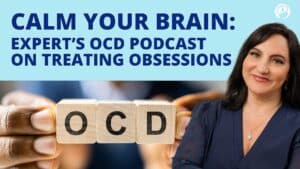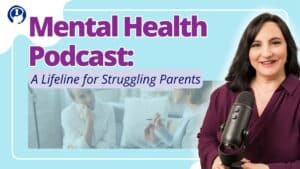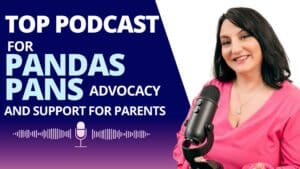As a parent or guardian of a child with PANS/PANDAS, you may be wondering how to create a school success plan for your child. PANS/PANDAS, or Pediatric Acute-onset Neuropsychiatric Syndrome/Pediatric Autoimmune Neuropsychiatric Disorders Associated with Streptococcal Infections, is a condition that affects children and can lead to symptoms such as sudden onset of obsessive-compulsive behaviors, anxiety, and mood swings.
For children and teens with PANS/PANDAS even being physically and mentally well enough to be at school is a challenge. While education is important, the health of a child certainly trumps education. Once a child is well enough to return to school, a 504 Accommodation plan can put supports in place that can help a child be successful.
Having created probably hundreds of 504 plans for students with PANS/PANDAS or AE, making sure it supports “flare” periods or times when the child has a resurgence of symptoms.
What is PANS/PANDAS and AE?
PANS/PANDAS are separate conditions that occur when a child's immune system produces antibodies that attack the brain, leading to sudden onset of neuropsychiatric symptoms. These symptoms can include obsessive-compulsive behaviors, tics, anxiety, depression, and difficulty with attention and learning. PANS/PANDAS is often triggered by an infection, most commonly strep throat, Lyme Disease, mold, and other infections or toxins.
AE, or autoimmune encephalitis, is a related condition in which the immune system produces antibodies that attack the brain, leading to a variety of neurological symptoms. What distinguishes AE from PANS/PANDAS is that it doesn’t have to have a sudden onset. The source of and the symptoms are otherwise the same.
How PANS/PANDAS Affects Learning, Attention and Behavior
PANS/PANDAS can have a significant impact on a child's ability to learn, pay attention, and behave in the classroom. Children with PANS/PANDAS may experience sudden onset of symptoms that can make it difficult for them to focus on their schoolwork.
- Sudden onset of symptoms that can make it difficult to focus on schoolwork.
- Anxiety and mood swings that can interfere with learning and classroom participation.
- Anxiety, depression, OCD and other clinical issues that lead to school refusal.
- Anger that impacts social functioning.
- Obsessive-compulsive behaviors that can disrupt classroom activities.
- Tics and other involuntary movements that can be distracting for both the child and their classmates.
- Impulsivity that can lead to difficulty following directions or staying on task.
- Memory problems that can impact learning and retention of information.
- Emotional dysregulation that can cause outbursts or meltdowns.
- Fatigue and lethargy that can impact attendance and participation in school activities.
- Sensory processing issues, which can impact a child's ability to focus and learn in a stimulating environment.
- Difficulty with executive functioning, which can cause problems with planning, organization, and time management.
- Problems with task initiation and completion.
- Problems staying focused while reading and writing.
- Visual issues that impact reading.
- Hyperactivity, which can make it difficult for a child to sit still and focus on their work.
- Regression in developmental skills, such as language, motor skills, or social skills.
- Sleep disturbances, which can impact a child's ability to stay alert and focused during the school day.
- Chronic pain or discomfort, which can be distracting and make it difficult to focus on schoolwork.
- Inconsistent behaviors due to flares.
All of these symptoms can make it challenging for children with PANS/PANDAS or AE to succeed in school without the proper support and accommodations. It is important for parents, guardians, school staff, and health care providers to work together to provide the necessary support for these students to thrive in the classroom.
Steps to Ask for a 504 Plan for PANS/PANDAS
If your child has been diagnosed with PANS/PANDAS or AE, it is important to work with your child's school to create a plan to support their success in the classroom. One option is to request a 504 plan, which is a legal document that outlines the accommodations and modifications that your child needs to receive a free and appropriate education.
To request a 504 plan, a parent should:
- Contact the school's 504 coordinator. Every school district is required to have a designated 504 coordinator who is responsible for overseeing the implementation of 504 plans.
- Request an evaluation. The school will need to conduct an evaluation to determine whether your child is eligible for a 504 plan. This evaluation may include assessments by school personnel, a record review including an examination of school standardized tests, as well as input from your child's mental health or healthcare provider.
- Attend a meeting. Once the evaluation is complete, you will attend a meeting with school staff to discuss the results and determine whether your child is eligible for a 504 plan, which means their PANS/PANDAS has a significant impact on your child’s education.
- Develop a plan. If your child is found to be eligible for a 504 plan, you will work with the school to develop a plan that outlines the accommodations and modifications your child needs to succeed in the classroom.
Accommodations for PANS/PANDAS
When developing a 504 plan for a child with PANS/PANDAS, there are a variety of accommodations that can be considered depending on what symptoms your child is experiencing. It is important to work with your child's healthcare provider and the school team to determine which accommodations will be most helpful for your child.
504 accommodations for PANS/PANDAS/AE may include:
- Extra time on assignments and tests.
- Reduced workload
- Breaks as needed.
- Access to high protein snacks
- The ability to work in a quieter environment.
- Access to assistive technology, such as speech-to-text software.
- Permission to use fidget toys or other assistive devices
- Sensory supports
- A designated person at school who can help the child manage their symptoms.
- A designated area they can go to when overwhelmed or upset.
- A plan for excused absences or missed assignments due to flare-ups or doctor appointments.
- Flexible or late start schedule.
- Support from a school psychologist or counselor.
- Additional training for school staff on how to support the child with PANS/PANDAS and common co-occuring conditions such as OCD.
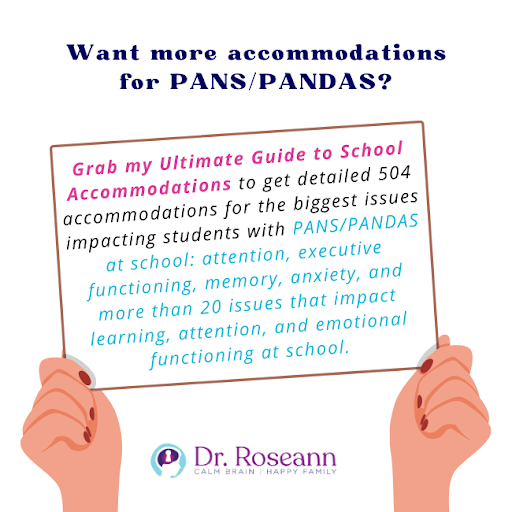
PANS/PANDAS can fall under both categories, depending on the severity of the symptoms and their impact on the child's ability to learn. Ultimately, the decision between a 504 plan and an IEP should be made based on the individual needs of the child.
Chart for 504 Plan vs IEP for PANS/PANDAS
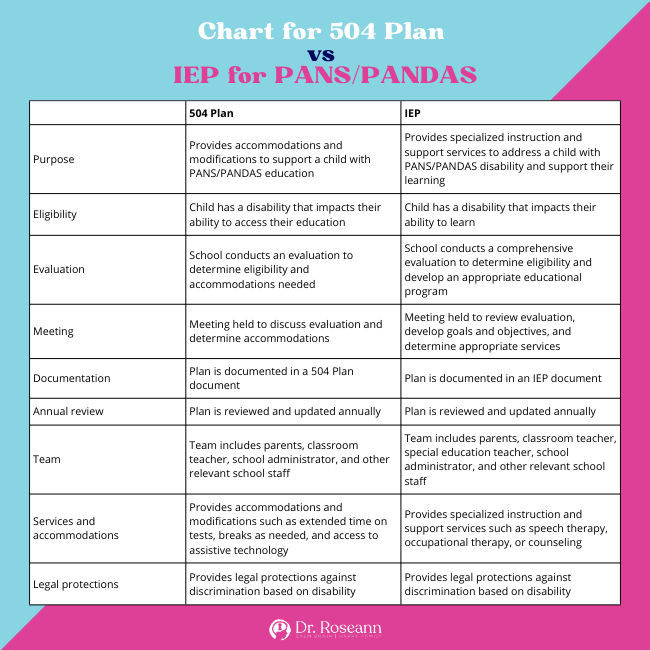
Suggestions for Teachers and School Personnel Supporting Students with PANS/PANDAS
Teachers and school personnel can play a crucial role in supporting students with PANS/PANDAS. It is essential that school staff get training in what PANS/PANDAS/AE is and how it affects students.
One of the most common questions I get about PANS/PANDAS is about why the child’s behaviors are so inconsistent. Explaining to staff that it occurs because of how brain inflammation goes up and down with stress, other infections, lack of sleep, problems with detoxification, and the infections and toxins within the body. When the brain is more inflamed, then symptoms increase and when inflammation is lower, behaviors decrease.
Suggestions for how school staff can support these students:
- Learn about PANS/PANDAS and how the condition can impact a child's learning and behavior.
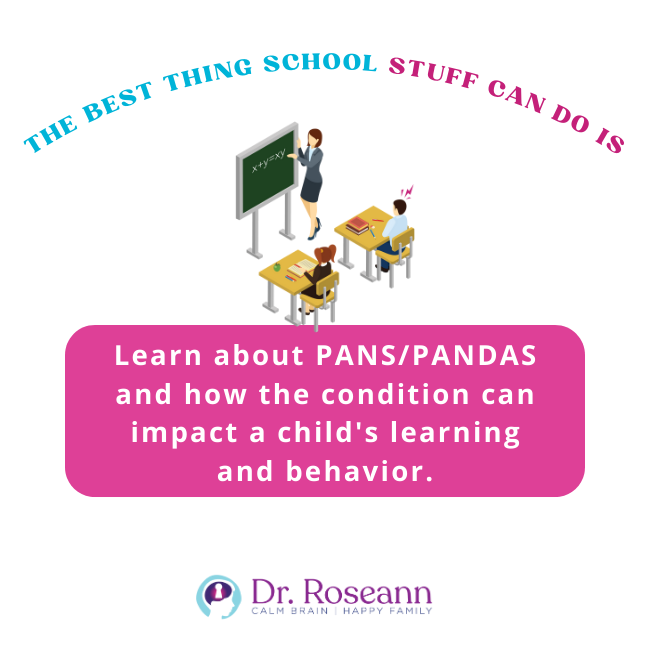
- Work with the parents to understand the child's needs and how they can be supported in the classroom.
- Work with the parents and school team to develop a 504 plan or IEP that outlines the accommodations and modifications the child needs.
- Recognize that the child’s behaviors and issues will be variable and don’t challenge the child or family because of this variability.
- Provide a quiet space for the child to work in when needed.
- Allow for flexibility in the child's schedule and assignments to accommodate for flare-ups or missed days.
- When a student is out of school or has school refusal, be creative and thoughtful in getting a student back to school.
- Provide support for the child's social-emotional needs, such as access to a school counselor or psychologist.
- Work with the child's healthcare provider to ensure that the child is receiving appropriate medical treatment.
- Seek out additional training on how to support students with PANS/PANDAS.
PANS/PANDAS can have a significant impact on a child's ability to learn, pay attention, and behave in the classroom. Working with the school to create a 504 plan or IEP can help provide the support and accommodations that these students need to succeed.
It is important for parents, guardians, and school staff to work together to ensure that students with PANS/PANDAS receive the appropriate school accommodations and support they need to be successful in school.
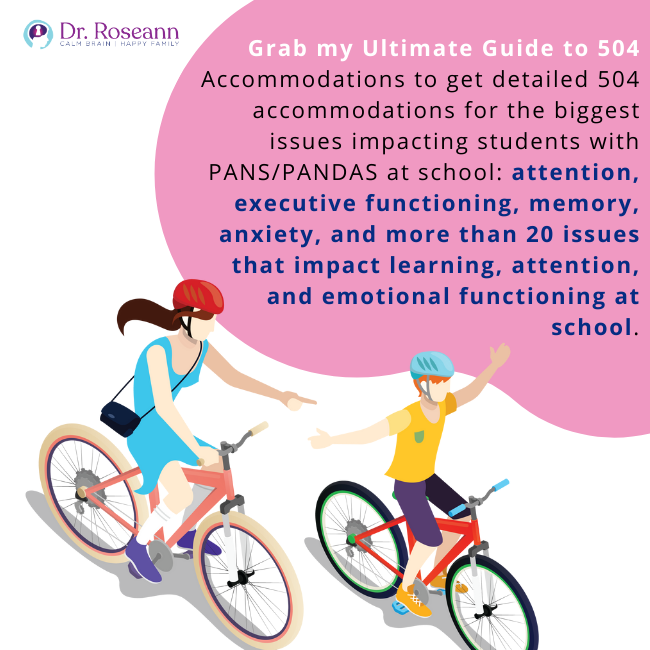
How to Improve PANS/PANDAS Symptoms
Neurofeedback is a powerful tool that can provide significant benefits to children with PANS/PANDAS. With PANS/PANDAS, children can experience a range of symptoms such as rage, tics, obsessions, anxiety, and learning difficulties that can be challenging to manage. Neurofeedback is a safe and effective treatment method that can help regulate the nervous system and improve attention, cognitive functioning, and emotional stability.
My trademarked BrainBehaviorReset™ Program uses neurofeedback, biofeedback, and PEMF to address many related issues that children with PANS/PANDAS face. Having worked with thousands of children, I personally design a protocol that addresses dysregulated brain states and create personalized treatment plans that help to restore emotional wellness and stability. Taking the holistic path to remedies for PANS/PANDAS is part of the healing journey and we incorporate many evidence-based approaches in our program.
Neurofeedback can help children with PANS/PANDAS overcome many common symptoms such as rage, obsessions, anxiety, and learning difficulties. In our program, we calm the brain and give parents the tools to manage symptoms and achieve success in the classroom and in their daily lives.
Citations:
U.S. Department of Education. (2016). Parent and Educator Resource Guide to Section 504 in Public Elementary and Secondary Schools. Retrieved from https://www2.ed.gov/about/offices/list/ocr/docs/504-resource-guide-201612.pdf
Always remember… “Calm Brain, Happy Family™”
Disclaimer: This article is not intended to give health advice and it is recommended to consult with a physician before beginning any new wellness regime. *The effectiveness of diagnosis and treatment vary by patient and condition. Dr. Roseann Capanna-Hodge, LLC does not guarantee certain results.
Are you looking for SOLUTIONS for your struggling child or teen?
Dr. Roseann and her team are all about solutions, so you are in the right place!
There are 3 ways to work with Dr. Roseann:
- In-person at her Ridgefield, CT center
- Virtually with her at home neurofeedback and coaching programs
- By joining my Natural Parenting Solutions for ADHD, EF, LD, Anxiety, OCD, Mood & PANS/PANDAS Community
You can get her books for parents and professionals, including: It’s Gonna Be OK™: Proven Ways to Improve Your Child’s Mental Health, Teletherapy Toolkit™ and Brain Under Attack: A Resource For Parents and Caregivers of Children With PANS, PANDAS, and Autoimmune Encephalopathy.
If you are a business or organization that needs proactive guidance to support employee mental health or an organization looking for a brand representative, check out Dr. Roseann’s professional speaking page to see how we can work together.
Dr. Roseann is a Children’s Mental Health Expert and Therapist who has been featured in/on hundreds of media outlets including, CBS, NBC, FOX News, PIX11 NYC, The New York Times, The Washington Post,, Business Insider, USA Today, CNET, Marth Stewart, and PARENTS. FORBES called her, “A thought leader in children’s mental health.”

She is the founder and director of The Global Institute of Children’s Mental Health and Dr. Roseann Capanna-Hodge. Dr. Roseann is a Board Certified Neurofeedback (BCN) Practitioner, a Board Member of the Northeast Region Biofeedback Society (NRBS), Certified Integrative Mental Health Professional (CIMHP) and an Amen Clinic Certified Brain Health Coach. She is also a member of The International Lyme Disease and Associated Disease Society (ILADS), The American Psychological Association (APA), Anxiety and Depression Association of America (ADAA) National Association of School Psychologists (NASP), International OCD Foundation (IOCDF) International Society for Neurofeedback and Research (ISNR) and The Association of Applied Psychophysiology and Biofeedback (AAPB).
© Roseann-Capanna-Hodge, LLC 2023



